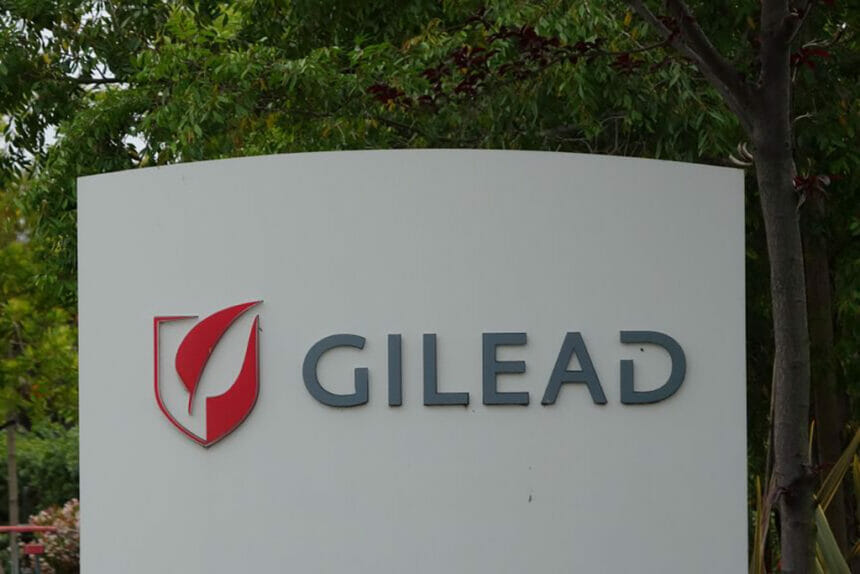Several companies are testing TROP2 antibody-drug conjugates (ADC) along with checkpoint inhibitors as part of a new option for treating non-small cell lung cancer (NSCLC).
While a best-in-class agent has yet to emerge, a Gilead-backed trial pairing its TROP2 agent Trodelvy with Merck’s immuno-oncology med Keytruda recently yielded promising results in patients with previously untreated NSCLC.
The preliminary analysis of the Phase 2 study, dubbed EVOKE-02, suggests that Trodelvy (sacituzumab govitecan-hziy), already approved in breast and urothelial cancer, could also play a role as an I/O-combo option in first-line metastatic NSCLC. A Phase 3 trial comparing the combo to Keytruda monotherapy in this setting (EVOKE-3) has been ongoing since January 2022.
“The EVOKE-02 trial is the first data presented from several Gilead studies dedicated to exploring Trodelvy’s potential in lung cancer,” stated Bill Grossman, SVP and therapeutic area head for Gilead Oncology. “These data are very encouraging.”
In the study, patients were assigned to one of two cohorts — A or B — depending on disease status or PD-L1 expression, as measured by their tumor proportion score (TPS). The higher the patient’s TPS, the better their chance of responding to checkpoint inhibitors.
The first group included 29 subjects with squamous/non-squamous NSCLC and TPS of 50% and above while the second group (32 subjects) had a TPS of below 50%. Cohort A showed an objective response rate (ORR) of 69% while cohort B’s was 44%.
Across both cohorts, the ORR was 56%. Median duration of response was not reached at the time of data cut-off, but reached 88% at six months, Gilead noted.
The numbers, which were toplined at the World Conference on Lung Cancer earlier this month ahead of the study abstract’s release, appeared roughly in line with those seen with the current standard of care, which involves Keytruda and chemotherapy.
Still, analysts said it was difficult to put the data into context.
Trodelvy could be an “active agent” in the NSCLC setting, especially among patients whose tumors express high amounts of PD-L1, wrote J.P. Morgan analyst Chris Schott in an earlier investor note, adding that he’s awaiting more data from EVOKE-02 and EVOKE-03 to make that determination.
In a previous trial called KN-189, Keytruda plus chemo saw an ORR in the “low 60s” in the 50%-or-greater TPS population and ORR in the 30%-to-40% range in the under-50% population, Schott recalled.
On the safety front, side effects appeared slightly better than chemo combo. Adverse events were less severe, with 3% of patients presenting pneumonitis, the same percentage seen in KN-189, with no deaths related to interstitial lung disease.
“Net-net, we will clearly need to see more data and additional studies (both from a tolerability and efficacy standpoint) to better assess the role Trodelvy (and TROP2 agents more broadly) could play in NSCLC,” Schott observed.
That’s been the story for TROP2 ADCs as a class, with rivals disclosing only aggregate data in NSCLC. AstraZeneca’s own TROP2 agent, datopotamab deruxtecan (Dato-DXd), showed an ORR of 50% in the first-line doublet arm of AZ’s TROPION-Lung02 trial. Differences in TPS status and limited patient numbers make comparisons between the trials challenging.
Merck, meanwhile, has been emphasizing its own PD-1/TROP2 program, being developed with partner Kelun Biotech. In a trial pairing Kelun’s TROP2-targeted ADC MK-2870 (SKB264) with Keytruda, the duo demonstrated a “striking” early clinical signal in patients with advanced, epidermal growth factor receptor mutation positive (EGFRmut) NSCLC, wrote SVB Securities analyst Daina Graybosch in June.
The results supported Merck’s planned Phase 3 study in that setting, Graybosch noted. MK-2870’s performance was in-line with that of Dato-DXd and Trodelvy.
Of the more than two million people diagnosed with lung cancer in 2020, NSCLC accounted for some 85% of diagnoses. It’s a cancer with high expression of TROP-2 (trophoblast cell surface antigen 2), with about half of NSCLC cases diagnosed at the metastatic stage, Gilead said. Agents directed at TROP-2 are designed to bind to the surface of cells expressing the antigen.
Trodelvy’s second-quarter U.S. sales rose 6% to $189 million. That followed the drug’s approval in hormone receptor-positive, human epidermal growth factor receptor 2-negative
(HR+/HER2-) breast cancer and increased adoption in metastatic triple-negative breast cancer.







